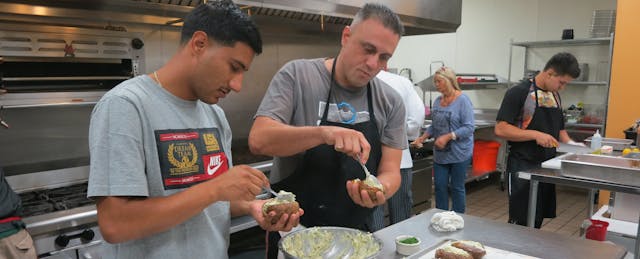Life can really get in the way of classroom learning--especially for adults trying to finish high school degrees or pick up vocational skills. For starters, transportation, childcare and job demands can push schooling to the bottom of the priority pile. Add the fact that many adult learners struggle with low literacy (one out of every six adults in America has trouble reading), low numeracy, low self-confidence, criminal records and few financial resources. Now try getting to class to complete a degree to get a better job. Tough, eh?
Enter “wrap–around services.” Traditionally, these are human beings who counsel students on how to find housing, transportation, health or emotional resources so the learning can continue. Tech entrepreneurs have created digital versions of “wrap-around” services for the general public (think Uber for transportation and care.com for babysitting). But engineers and designers could do more to specifically help adult learners.
With a nudge from EdSurge, one group of adult learners in the heart of Silicon Valley took a break from their classwork to describe the barriers they face in completing their education and to challenge the tech industry to innovate fixes.
The Adult Learners
The eight students in the informal focus group are enrolled in the free Culinary Skills Certificate Program at JobTrain in Menlo Park, CA. Of the over 1,000 students who have completed the program over the past decade, many from the diverse group--Latino, Asian and Caucasian participants of varied educational levels range in age from 22 to well over 50--have gone on to work in the kitchens of nearby tech companies including Facebook, Google and Linkedin.
As one student carries a tray of freshly made beignets from the teaching kitchen to an adjacent meeting room to fuel the brainstorming session, students listen to the discussion intently. Although all but one say they use their smart phones more than an hour a day (mostly for socializing), they all say they heard about JobTrain, through word of mouth, not digitally. Three students chime in with challenges for developers.
Motivate Me!
José Martinez [1], 22, graduated from high school and put in a few years at community college before dropping out. “Life was getting tough,” he explained. He got two jobs and is now enrolled in the four month culinary program at JobTrain. He says he could really use a motivational tool on his phone to help him get to class and continue the program. In fact, there are plenty of motivational apps on the market, but most are designed to assist with exercise and dieting.
Next to Martinez sits John Sailer, who is over 40 and worked as a cook for many years. He’s at JobTrain to refresh his skills while he goes through alcohol rehabilitation. Sailer says he’d like an on-demand personal therapist. “You could text the counselor and if you’re irritated at the moment--you get counseling right when you need it,” he explains. Indeed, Sailer’s idea is good enough that many websites have already sprung up offering counseling on demand.
Erase My Criminal Record
Sailer is also looking for a job these days and says his felony record is a stumbling block. Sailer’s second tech challenge? “I’d like an app or a website that would get a felony expunged, so I wouldn’t have to go to the courthouse to file papers or hire an attorney.” Most websites about felony expungement are referrals to attorneys.
Find Me Housing
Perry Henrick Jr., who’s over 50, spent most of his life as a construction worker until he hurt his back. Now he’d like to start his own business and says a cost-analysis tool for making a recipe, starting a business or finding affordable housing would be helpful. There are a number of websites and apps that provide these services, but Henrick, with low digital literacy, has not yet found them.
Design for Adult Learners
Chef Adam Weiner, the jovial yet no-nonsense teacher, directs the students back to the kitchen to prepare for an upcoming reception. Then, he pulls up a chair at the meeting room table to weigh in. “Chef Adam,” as he calls himself, has been teaching this culinary skills class in Silicon Valley for more than a decade, and he’s been placing his students in kitchen jobs at the surrounding tech companies for years. He has unbridled opinions about what tech could do for his students.
Weiner points out that while his students may use their smart phones, he estimates fully 50% are not computer savvy. “I’d like to see a ‘wrap-around’ app on how to use ‘wrap-around’ services” for students who are not digitally literate, he explains. Videos on computer literacy, he suggests, would be a good start. After that, he’d like to see apps and software in simplified English and translatable into other languages with plenty of icons, pictures and graphics. The Goodwill Community Foundation’s adult learning website does address many of Chef Weiner’s instructional goals. But that’s just a start.
Chef Weiner thinks developers ought to design more with the adult student in mind. He says, “You shouldn’t need a college degree to use an app intended for someone with a 7th grade education.”
[1] Names of all students have been changed to protect their privacy.


